英语不能用被动语态的若干情况
英语不能用被动语态的情况

不能用被动语态的情况初中语法:1) 不及物动词或动词短语无被动语态:appear, die disappear, end (vi. 结束), fail, happen, last, lie, remain, sit, spread, stand break out, come true, fall asleep, keep silence, lose heart, take place.After the fire, very little remained of my house.比较:rise, fall, happen是不及物动词;raise, seat是及物动词。
(错) The price has been risen.(对) The price has risen.(错) The accident was happened last week.(对) The accident happened last week.(错) The price has raised.(对) The price has been raised.(错) Please seat.(对) Please be seated.要想正确地使用被动语态,就须注意哪些动词是及物的,哪些是不及物的。
特别是一词多义的动词往往有两种用法。
解决这一问题唯有在学习过程中多留意积累。
2) 不能用于被动语态的及物动词或动词短语:fit, have, hold, marry, own, wish, cost, notice, watch agree with, arrive at / in, shake hands with, succeed in, suffer from, happen to, take part in, walk into, belong to This key just fits the lock.Your story agrees with what had already been heard.3) 系动词无被动语态:appear, be become, fall, feel, get, grow, keep, look, remain, seem, smell, sound, stay, taste, turnIt sounds good.4) 带同源宾语的及物动词,反身代词,相互代词,不能用于被动语态:die, death, dream, live, lifeShe dreamed a bad dream last night.5) 当宾语是不定式时,很少用于被动语态。
不能用于被动语态的几种情况总结

不能用于被动语态的几种情况总结Document number:PBGCG-0857-BTDO-0089-PTT1998不能用于被动语态的几种情况总结四川省阆中中学校任金石1、there be 结构及所有的不及物动词或动词短语充当谓语时,无被动语态。
:There are twelve moths in a year,Many of his songs have remained popular as ever,他的许多歌曲和以往一样仍然很流行。
Winning the medal is like a dream come true.获得奖牌好比梦想成真。
注:常见的不及物动词或动词短语有:appear, die, happen, lie(躺;位于), remain, occur, come true, break out, take place 等。
2、表示“状态”的谓语动词,如:last, hold, benefit, contain, equal, fit, join, mean, look like, consist of 等不能用被动语态。
:Each game lasts about an hour.每场比赛约一小时。
The committee consists of ten members.委员会由十人组成。
3、表示“归属”的动词,如have,own,belong to 等。
:We have three meals a day.我们一日吃三餐。
These islands belong to Spain.这些岛屿隶属西班牙。
4、表示“希望、意图”的动词,如wish,want,hope,like,love,hate等。
:But I hate autumn and winter。
但是我讨厌秋天和冬天。
5、宾语是反身代词或相互代词时谓语动词用主语语态,不能用被动语态。
:We should help each other.I found myself unable to speak.我发现自己说不出话了。
英语中不能用于被动语态的动词都有哪些
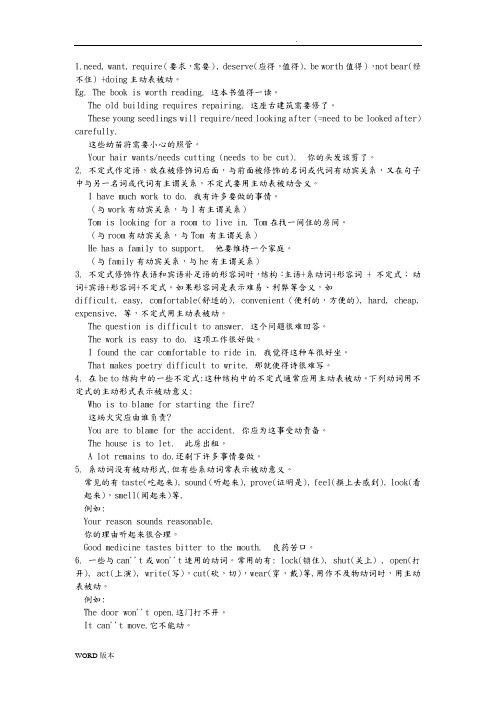
1.need, want, require(要求,需要), deserve(应得,值得), be worth值得),not bear(经不住) +doing主动表被动。
Eg. The book is worth reading. 这本书值得一读。
The old building requires repairing. 这座古建筑需要修了。
These young seedlings will require/need looking after (=need to be looked after) carefully.这些幼苗将需要小心的照管。
Your hair wants/needs cutting (needs to be cut).你的头发该剪了。
2. 不定式作定语,放在被修饰词后面,与前面被修饰的名词或代词有动宾关系,又在句子中与另一名词或代词有主谓关系,不定式要用主动表被动含义。
I have much work to do. 我有许多要做的事情。
(与work有动宾关系,与I有主谓关系)Tom is looking for a room to live in. Tom在找一间住的房间。
(与room有动宾关系,与Tom 有主谓关系)He has a family to support.他要维持一个家庭。
(与family有动宾关系,与he有主谓关系)3. 不定式修饰作表语和宾语补足语的形容词时,结构:主语+系动词+形容词 + 不定式;动词+宾语+形容词+不定式。
如果形容词是表示难易、利弊等含义,如difficult, easy, comfortable(舒适的), convenient(便利的,方便的), hard, cheap, expensive, 等,不定式用主动表被动。
The question is difficult to answer. 这个问题很难回答。
The work is easy to do. 这项工作很好做。
不能用被动语态的几种情况
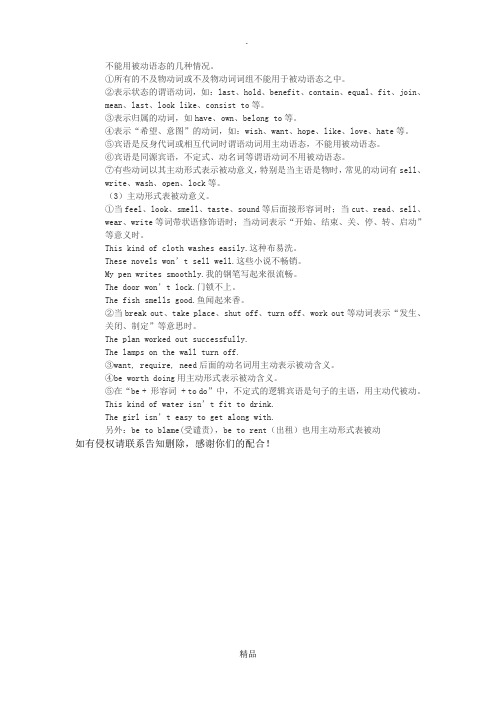
.不能用被动语态的几种情况。
①所有的不及物动词或不及物动词词组不能用于被动语态之中。
②表示状态的谓语动词,如:last、hold、benefit、contain、equal、fit、join、mean、last、look like、consist to等。
③表示归属的动词,如have、own、belong to等。
④表示“希望、意图”的动词,如:wish、want、hope、like、love、hate等。
⑤宾语是反身代词或相互代词时谓语动词用主动语态,不能用被动语态。
⑥宾语是同源宾语,不定式、动名词等谓语动词不用被动语态。
⑦有些动词以其主动形式表示被动意义,特别是当主语是物时,常见的动词有sell、write、wash、open、lock等。
(3)主动形式表被动意义。
①当feel、look、smell、taste、sound等后面接形容词时;当cut、read、sell、wear、write等词带状语修饰语时;当动词表示“开始、结束、关、停、转、启动”等意义时。
This kind of cloth washes easily.这种布易洗。
These novels won’t sell well.这些小说不畅销。
My pen writes smoothly.我的钢笔写起来很流畅。
The door won’t lock.门锁不上。
The fish smells good.鱼闻起来香。
②当break out、take place、shut off、turn off、work out等动词表示“发生、关闭、制定”等意思时。
The plan worked out successfully.The lamps on the wall turn off.③want, require, need后面的动名词用主动表示被动含义。
④be worth doing用主动形式表示被动含义。
⑤在“be + 形容词 + to do”中,不定式的逻辑宾语是句子的主语,用主动代被动。
不能用于被动语态的情况

一。
常见的系动词look (看起来),sound (听起来),taste (尝起来),smell (闻起来),feel(感到),go (变得),grow (变得)等。
二、一些不能接宾语的动词短语也没有被动语态。
1.The war broke out in 1937.(break out,爆发)2.The story took place in a small mountain village.(发生,take place)三、甚至有些及物动词和可以接宾语的动词短语要看他们作什么意思讲,有时也只能有主动语态而不宜于用被动语态。
1.We have six classes every day. (have,上课)2.The hall can hold more than 500 people. (held,容纳)3.The project lasted 14 years and cost I billion US dollars.(last,延续)4.No dish suits all tastes. (suit,适合)类似的还有fit ,catch ,get ,take ,own ,meet 等。
四、而有些动词和短语兼有及物和不及物两种用法,所以前者有被动语态,而后者没有。
1.He serves in the Navy Department. (服役,不及物)2.Hamburger is served in this restaurant. (供应,及物)3.The plane toke off at eight last night. (起飞,不及物)类似的还有look into (作往里看,不及物;作调查、研究,及物)look up (作好转,不及物;作查阅,及物)等。
五、而如果及物动词后的宾语是反身代词,相互代词;或者宾语前面有和主语同一人物的物主代词;或者是同源宾语的动词,也常常不能转换为被动语态。
英语不能变为被动语态的情形解析
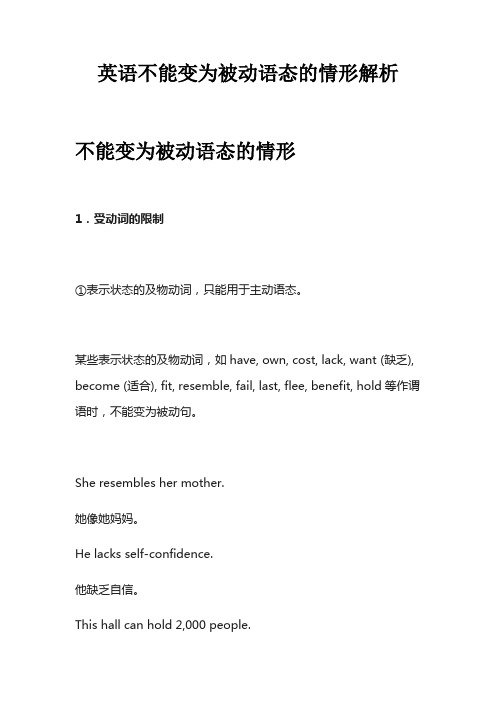
英语不能变为被动语态的情形解析不能变为被动语态的情形1.受动词的限制①表示状态的及物动词,只能用于主动语态。
某些表示状态的及物动词,如have, own, cost, lack, want (缺乏), become (适合), fit, resemble, fail, last, flee, benefit, hold等作谓语时,不能变为被动句。
She resembles her mother.她像她妈妈。
He lacks self-confidence.他缺乏自信。
This hall can hold 2,000 people.这个大厅能容纳两千人。
②当及物动词have表示“吃饭”、“患病”、“明白”、“知道”等意思时,没有被动语态形式。
Would you have a cup of tea ?你要喝杯茶吗?She had a bad cold yesterday, and now she is feeling much better.昨天她得了重感冒,现在好多了。
③当动词get,take表示“懂得”、“知道”,owe表示“欠”,cost表示“使失去(生命、健康等)”的意思时,动词没有相应的被动语态。
Do you get me ?你明白我的意思吗?How do you take this passage这段话你怎么理解?I owe 50 pounds to you.我欠你五十英镑。
His careless driving cost his life.他粗心的驾驶使他丧了命。
2.受宾语的限制①当宾语是相互代词、反身代词或具有类似相互代词的关系时,动词不能用于被动语态形式。
They simply cannot contain themselves for joy.他们简直无法抑制内心的喜悦。
He absented himself from a meeting yesterday.他昨天缺席会议了。
英语不能用被动语态的若干情况
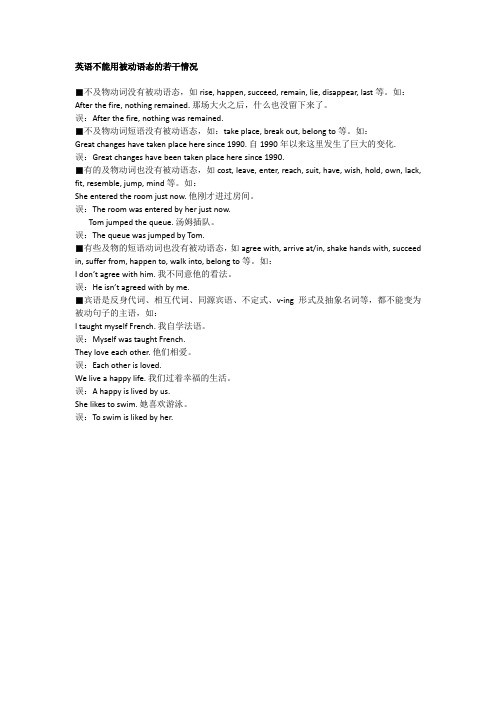
英语不能用被动语态的若干情况■不及物动词没有被动语态,如rise, happen, succeed, remain, lie, disappear, last等。
如:After the fire, nothing remained. 那场大火之后,什么也没留下来了。
误:After the fire, nothing was remained.■不及物动词短语没有被动语态,如:take place, break out, belong to等。
如:Great changes have taken place here since 1990. 自1990年以来这里发生了巨大的变化.误:Great changes have been taken place here since 1990.■有的及物动词也没有被动语态,如cost, leave, enter, reach, suit, have, wish, hold, own, lack, fit, resemble, jump, mind等。
如:She entered the room just now. 他刚才进过房间。
误:The room was entered by her just now.Tom jumped the queue. 汤姆插队。
误:The queue was jumped by Tom.■有些及物的短语动词也没有被动语态,如agree with, arrive at/in, shake hands with, succeed in, suffer from, happen to, walk into, belong to等。
如:I don’t agree with him.我不同意他的看法。
误:He isn’t agreed with by me.■宾语是反身代词、相互代词、同源宾语、不定式、v-ing形式及抽象名词等,都不能变为被动句子的主语,如:I taught myself French. 我自学法语。
英语不能用被动语态的情况

英语不能用被动语态的情况不能用被动语态的情况初中语法:1)不及物动词或动词短语无被动语态:appear, die disappear, end (vi.结束),fail, happe n, last, lie, rema in, sit, spread, sta nd break out, come true, fall asleep, keep sile nee, lose heart, take place.After the fire, very little remained of my house.比较:rise, fall, happen是不及物动词;raise, seat是及物动词。
(错)The price has bee n rise n.(对)The price has rise n.(错)The accide nt was happe ned last week.(对)The accide nt happe ned last week.(错)The price has raised.(对)The price has bee n raised.(错)Please seat.(对)Please be seated.要想正确地使用被动语态,就须注意哪些动词是及物的,哪些是不及物的。
特别是一词多义的动词往往有两种用法。
解决这一问题唯有在学习过程中多留意积累。
2)不能用于被动语态的及物动词或动词短语:fit, have, hold, marry, own, wish, cost, notice, watch agree with, arrive at / in, shake hands with, succeed in, suffer from, happe n to, take part in, walk in to, bel ong toThis key just fits the lock.Your story agrees with what had already bee n heard.3)系动词无被动语态:appear, be become, fall, feel, get, grow, keep, look, rema in, seem, smell, sound, stay, taste, turn It sounds good.4)带同源宾语的及物动词,反身代词,相互代词,不能用于被动语态:die, death, dream, live, lifeShe dreamed a bad dream last ni ght.5)当宾语是不定式时,很少用于被动语态。
英语语法不能用被动语态的几种情况

英语语法不能用被动语态的几种情况1)某些表示“静态”的及物动词(表示状态而不是动作,而且常常是不可用于进行时态的动词)如have,fit,suit,hold(容纳),cost,suffer,last(持续)等不能用于被动语态。
如:They have a nice car. 他们有一辆漂亮的汽车。
My shoes don't fit me. 我的鞋不合适。
My brain can't hold so much information at one time. 我的脑子一下子记不住这么多资料。
How much /What does it cost?这值多少钱?Our holiday lasts 10days. 我们的假期有十天。
This food will last(them)(for)3days. 这食物足够(他们)(吃)三天。
2)不是所有带介词的动词都能用于被动结构。
若是构成成语动词通常有被动态,若不构成成语动词则无被动态。
试比较:They arrived at a decision. /A decision was arrived at. 他们作出了决定。
They arrived at the station. 他们到达车站。
(不说:The station was arrived at. )He looked into the question. /The question was looked into. 他调查了这个问题。
3)动词leave(离开),enter(进入),join(参加)这一类词不可用于被动语态。
如:The car left the road and hit a tree. 车子离开了道路,撞上了树。
4)某些及物动词可作不及物动词用,特别是后加副词(如well,easily 等)时。
主动语态有被动含义,这类动词常见的有sell,write,wear,wash,cook,open,close,lock,read,record等。
英语中不能用于被动语态的动词都有哪些

英语中不能用于被动语态的动词都有哪些-CAL-FENGHAI.-(YICAI)-Company One11.need, want, require(要求,需要), deserve(应得,值得), be worth值得),not bear(经不住) +doing主动表被动。
Eg. The book is worth reading. 这本书值得一读。
The old building requires repairing. 这座古建筑需要修了。
These young seedlings will require/need looking after (=need to be looked after) carefully.这些幼苗将需要小心的照管。
Your hair wants/needs cutting (needs to be cut).你的头发该剪了。
2. 不定式作定语,放在被修饰词后面,与前面被修饰的名词或代词有动宾关系,又在句子中与另一名词或代词有主谓关系,不定式要用主动表被动含义。
I have much work to do. 我有许多要做的事情。
(与work有动宾关系,与I有主谓关系)Tom is looking for a room to live in. Tom在找一间住的房间。
(与room有动宾关系,与Tom 有主谓关系)He has a family to support.他要维持一个家庭。
(与family有动宾关系,与he有主谓关系)3. 不定式修饰作表语和宾语补足语的形容词时,结构:主语+系动词+形容词 + 不定式;动词+宾语+形容词+不定式。
如果形容词是表示难易、利弊等含义,如difficult, easy, comfortable(舒适的), convenient(便利的,方便的), hard, cheap, expensive, 等,不定式用主动表被动。
The question is difficult to answer. 这个问题很难回答。
英语中不用被动语态的几种情况
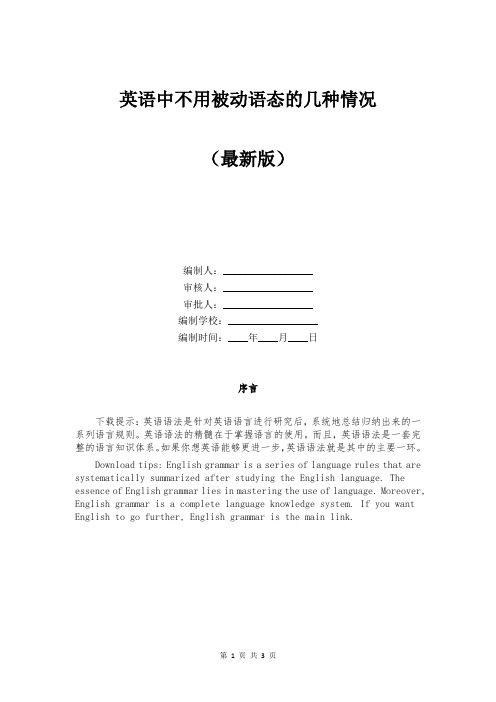
英语中不用被动语态的几种情况(最新版)编制人:__________________审核人:__________________审批人:__________________编制学校:__________________编制时间:____年____月____日序言下载提示:英语语法是针对英语语言进行研究后,系统地总结归纳出来的一系列语言规则。
英语语法的精髓在于掌握语言的使用。
而且,英语语法是一套完整的语言知识体系。
如果你想英语能够更进一步,英语语法就是其中的主要一环。
Download tips: English grammar is a series of language rules that are systematically summarized after studying the English language. The essence of English grammar lies in mastering the use of language. Moreover, English grammar is a complete language knowledge system. If you want English to go further, English grammar is the main link.正文内容1. 谓语为连系动词时,不用被动语态。
如:He looked fine. 他气色好。
The food tastes delicious. 这食物味道很好。
2. 谓语为不及物动词(短语)时,不用被动语态。
如:The war broke out in the end. 战争终于爆发了。
I happened to meet him there. 我碰巧在哪儿见到了他。
3. 宾语为不定式、动词的-ing 形式或从句,表示主语的一些想法、爱好或愿望时,一般不用被动语态。
如:He decided to go with us. 他决定跟我们一起去。
中考英语考点之不用被动语态情况(完整版)

中考英语考点之 不用被动语态情况不能使用被动语态的情况被动语态的特殊情况:1. 不能用被动语态的几种情况:(1)所有的不及物动词或不及物动词词组不能用于被动语态。
(2)表示状态的谓语动词,如:last、hold、benefit、contain、equal、fit等。
(3)表示归属的动词,如have、own、belong to等。
(4)表示"希望、意图"的动词,如:wish、want、hope、like、love、hate等。
(5)宾语是反身代词或相互代词时谓语动词用主动语态,不能用被动语态。
2. 主动形式表被动意义的情况:(1)系动词没有被动形式,但有些表示感受、感官的连系动词feel,sound,taste,book,feel等在主系表结构中常以主动形式表示被动意义。
(2)当cut,sell,read,write,fill,cook,lock,wash,drive,keep等词带状语修饰语时。
(3)当break out、take place、shut off、turn off、work out等动词词组表示"发生、关闭、制定"等意思时。
(4)want,require,need后面的动名词用主动表示被动含义。
(5)be worth doing用主动形式表示被动含义。
(6)在"be + 形容词+ to do"中,不定式的逻辑宾语是句子的主语,用主动代被动。
另外:be to blame(受谴责),be to rent(出租)也用主动形式表被动。
学科&网1. As time went on, Einstein’s theory __________ to be correct.A. provedB. provesC. is provedD. was proved2. The retired worker likes getting up early. The air in the morning is good__________.A.to be breathedB. to breatheC. breathingD. being breathed3. I find the problems are easy __________.A. to be worked outB. to work them outC. to work outD. to be worked them out.4. Later Mrs Smith decided to buy that kind of cloth because she _________ that the cloth_________very well.A. has been told; washesB. had been told; washedC. was told; was washedD. had been told; was washed5. If so many raw materials_________ every day, they_________ in the future.A. run out; will be used upB. run out; will be run outC. are run out; will be using upD. are run out; will run out of6. His computer, which cost him a sum of money several weeks ago, is out of order and wants _________, though it looks very new.A.to repairB.to be repairingC. repairingD. repaired7. —How about watching a film on Sunday?—I can’t go to watch a film with a lot of homework _________.A. to be doneB. to doC. doingD. done1. (2018 • 江苏宿迁中考)This kind of pen __________, and is also very cheap. I think you can buy some.A. writes wellB. writes goodC. is written wellD. is written good2. (2016 • 江西)The water __________ dark and dirty. It’s no longer safe to drink.A. becameB. has becomeC. will becomeD. was becoming3. (2017 • 安徽)I am surprised at the new look of my hometown, for it __________ a lot over the years.A. changedB. changesC. will changeD. has changed4.(2017 • 山东泰安)With the development of science and technology, robot cooks __________in our families in the future.A. appearB. appearedC. will appearD. is appearing5. (2017 • 湖北省随州市中考)—What __________ if they __________ to the meeting late?—Sorry, I don’t know.A. will happen; goB. happened; goC. happens; will goD. will happen; will go6. (2017 • 江苏省宿迁市中考)My grandparents __________ for over 60 years and they loveeach other very much.A. have been marriedB. got marriedC. were marriedD. have got married7.(2016 • 湖南邵阳)We __________ for a picnic if it __________ rain this Sunday.A. will go; doesn’tB. will go; won’tC. go; doesn’t8. (2016 • 江苏镇江)—Have you been to Suning Plaza(苏宁购物中心) in our city?—No. Although it __________ for more than a week, I’m far too busy to go there.A. has startedB. has been onC. has been openD. has opened9. (2016 • 山东青岛)William Shakespeare __________ for 400 years, but his works still have greatinfluence today.A. diedB. was dyingC. has diedD. has been dead1. —What’s the meaning of the activity "Let’s Save"?—Paper shouldn’t ____________ in everyday life.A. wasteB. wastedC. be wastedD. is wasted2. The Dongying-Hainan airline ____________ for about 5 months. I have taken the flights three times.A. is openB. has openedC. has been openD. has been opened3. My house ____________ when you visited Beijing last time, so I didn’t invite you to my home.A. was being decoratedB. is being decoratedC. has been decoratedD. was decorated4. My e-mail ____________ to you last night. Have you received it ____________?A. sent;yetB. is sent;alreadyC. was sent;yet5. In the past few years, thousands of films ____________ all over the world.A. have producedB. have been producedC. are producingD. are being produced6. —It’s difficult for the village children to cross the river for school.—I think a bridge ____________ over the river.A. should be builtB. is being builtC. has been builtD. was built7. The World Expo(世博会)____________ in Shanghai now.A. being hadB. is havingC. is holdingD. is being held8. Now it’s much easier to shop online when your order is ready, the things you want to buy____________to you soon.A. sendB. were sentC. are sendingD. will be sent【跟踪训练】1. A【解析】句意:随着时间的推移,爱因斯坦的理论证明是正确的。
英语不能用被动语态的情况

不能用被动语态的情况初中语法:1) 不及物动词或动词短语无被动语态:appear, die disappear, end (vi. 结束), fail, happen, last, lie, remain, sit, spread, standbreak out, come true, fall asleep, keep silence, lose heart, take place.After the fire, very little remained of my house.比较:rise, fall, happen是不及物动词;raise, seat是及物动词。
(错) The price has been risen.(对) The price has risen.(错) The accident was happened last week.(对) The accident happened last week.(错) The price has raised.(对) The price has been raised.(错) Please seat.(对) Please be seated.要想正确地使用被动语态,就须注意哪些动词是及物的,哪些是不及物的。
特别是一词多义的动词往往有两种用法。
解决这一问题唯有在学习过程中多留意积累。
2) 不能用于被动语态的及物动词或动词短语:fit, have, hold, marry, own, wish, cost, notice, watch agree with, arrive at / in, shake hands with, succeed in, suffer from, happen to, take part in, walk into, belong toThis key just fits the lock.Your story agrees with what had already been heard.3) 系动词无被动语态:appear, be become, fall, feel, get, grow, keep, look, remain, seem, smell, sound, stay, taste, turn It sounds good.4) 带同源宾语的及物动词,反身代词,相互代词,不能用于被动语态:die, death, dream, live, lifeShe dreamed a bad dream last night.5) 当宾语是不定式时,很少用于被动语态。
不能用被动语态的情况

不能用被动语态的情况(最新版)编制人:__________________审核人:__________________审批人:__________________编制单位:__________________编制时间:____年____月____日序言下载提示:该文档是本店铺精心编制而成的,希望大家下载后,能够帮助大家解决实际问题。
文档下载后可定制修改,请根据实际需要进行调整和使用,谢谢!并且,本店铺为大家提供各种类型的经典范文,如词性大全、句法大全、句型大全、从句大全、时态大全、语态大全、语法大全、虚拟语气、用法辨析、其他资料等等,想了解不同范文格式和写法,敬请关注!Download tips: This document is carefully compiled by this editor.I hope that after you download it, it can help you solve practical problems. The document can be customized and modified after downloading, please adjust and use it according to actual needs, thank you!In addition, this shop provides you with various types of classic sample essays, such as part of speech, syntax, sentence pattern, clause, tense, voice, grammar, subjunctive, usage analysis, other materials, etc. If you want to know the different formats and writing methods of the model essay, please pay attention!不能用被动语态的情况1) 不及物动词或动词短语无被动语态:appear, die disappear, end (vi. 结束), fail, happen, last, lie, remain, sit, spread, standbreak out, come true, fall asleep, keep silence, lose heart, take place.After the fire, very little remained of my house.比较: rise, fall, happen是不及物动词;raise, seat是及物动词。
不能用被动语态的几种情况之欧阳数创编
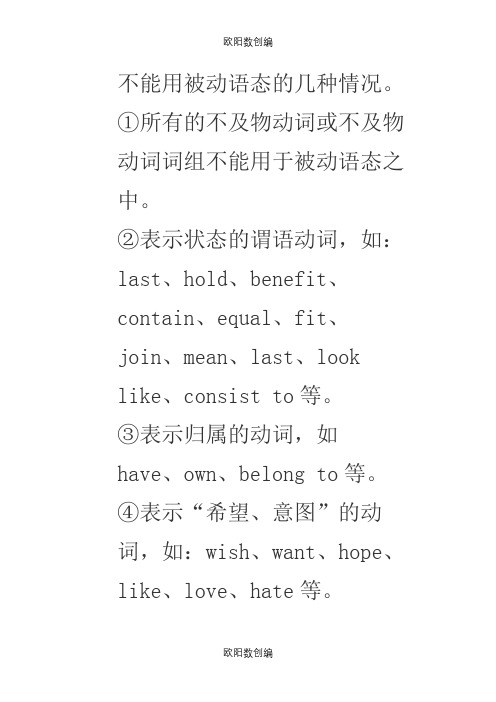
不能用被动语态的几种情况。
①所有的不及物动词或不及物动词词组不能用于被动语态之中。
②表示状态的谓语动词,如:last、hold、benefit、contain、equal、fit、join、mean、last、look like、consist to等。
③表示归属的动词,如have、own、belong to等。
④表示“希望、意图”的动词,如:wish、want、hope、like、love、hate等。
⑤宾语是反身代词或相互代词时谓语动词用主动语态,不能用被动语态。
⑥宾语是同源宾语,不定式、动名词等谓语动词不用被动语态。
⑦有些动词以其主动形式表示被动意义,特别是当主语是物时,常见的动词有sell、write、wash、open、lock 等。
(3)主动形式表被动意义。
①当feel、look、smell、taste、sound等后面接形容词时;当cut、read、sell、wear、write等词带状语修饰语时;当动词表示“开始、结束、关、停、转、启动”等意义时。
This kind of cloth washes easily.这种布易洗。
These novels won’t sell well.这些小说不畅销。
My pen writes smoothly.我的钢笔写起来很流畅。
The door won’t lock.门锁不上。
The fish smells good.鱼闻起来香。
②当break out、take place、shut off、turnoff、work out等动词表示“发生、关闭、制定”等意思时。
The plan worked out successfully.The lamps on the wall turn off.③want, require, need后面的动名词用主动表示被动含义。
④be worth doing用主动形式表示被动含义。
⑤在“be + 形容词 + to do”中,不定式的逻辑宾语是句子的主语,用主动代被动。
- 1、下载文档前请自行甄别文档内容的完整性,平台不提供额外的编辑、内容补充、找答案等附加服务。
- 2、"仅部分预览"的文档,不可在线预览部分如存在完整性等问题,可反馈申请退款(可完整预览的文档不适用该条件!)。
- 3、如文档侵犯您的权益,请联系客服反馈,我们会尽快为您处理(人工客服工作时间:9:00-18:30)。
The classroom is always kept clean.教室总是保持清洁的。
I don’t agree with him.我不同意他的看法。
误:He isn’t agreed with by me. ()
■宾语是反身代词、相互代词、同源宾语、不定式、v-ing形式及抽象名词等,都不能变为被动句子的主语,如:
I taught myself French.我自学法语。
正:Silk feels soft and smooth.
他并不像他看起来那么傻。
误:He is not such a fool as he is looked.
正:He is not such a fool as he looks.
(2)某些不及动词用主动表被动:用作不及物动词的open, close, shut, read, write, translate, wash, clean, lock, sell, wear, cut, cook等,当主语是物,且因该事物本身具有某一固有特点使得谓语动词能以某种方式得以实现或难以实现时,用主动形式表示被动含义。如:
误:After the fire, nothing was remained.
■不及物动词短语没有被动语态,如:take place, break out, belong to等。如:
Great changes have taken place here since 1990.自1990年以来这里发生了巨大的变化.
(1)连用动词用主动表被动:尤其是表示“……起来”的系动词,如sound(听起来), taste(吃起来), smell(闻起来), feel(摸起来), look, seem(看起来)等,尽管它在汉语意思含有被动意味,但英语却要用主动形式表示被动含义。如:
绸子摸起来柔软光滑。
误:Silk is felt soft and smooth.
据说龟比象活得久。
a. People say that tortoises live longer than elephants.
b. It is said that tortoises live longer than elephants.
c. Tortoises are said to live longer than elephants.
She entered the room just now.他刚才进过房间。
误:The room was entered by her just now.
Tom jumped the queue.汤姆插队。
误:The queue was jumped by Tom.
■有些及物的短语动词也没有被动语态,如agree with, arrive at/in, shake hands with, succeed in, suffer from, happen to, walk into, belong to等。如:
His suggestion is worth considering.他的建议值得考虑。
This clock is hardly worth repairing.这个钟几乎不值得修了。
主动语态变被动语态的易错点
■含有双宾语的主动句变被动句时,可分别将其中的一个宾语变为主语,另一个不动,但变间接宾语为主语的情况较多。
他们不允许我入场。
主动:They refused me admittance. (正)
被动:I was refused admittance by them. (正)
被动:Admittance was refused me by them. (少见)
主动表被动的常见情形
误:Myself was taught French.
They love each other.他们相爱。
误:Each other is loved.
We live a happy life.我们过着幸福的生活。
误:A happy is lived by us.
She likesTom gave me a present on my birthday.我生日那天汤姆送我一件礼物。
被动:I was given a present by Tom on my birthday.
A present was given to me yesterday.
注意:如果把直接宾语(指物)改为主语,则在间接宾语(指人)前加适当的介词。
以上句子涉及带双宾语动词的被动语态问题。这个问题可以从三个方面去概括:
■有些带双宾语的动词转换为被动语态时,可以有两种形式(即可用直接宾语或间接宾语作主语),这类动词主要的有:buy,give,lend,pay,show,teach,tell,offer,leave,award等:
他给了她一些钱。
他给她写了封信。
主动:He wrote her a letter. (正)
被动:A letter was written (to) her by him. (正)
被动:She was written a letter by him. (少见)
■有些带双宾语的动词转换为被动语态时,通常要用间接宾语作主语,这类动词主要的有:answer,refuse,save,spare,deny,envy等():
带双宾语动词的被动语态有何规律
请看几个句子:
主动:He answered me the question. (正)
被动:I was answered the question by him. (正)
被动:The question was answered me by him. (误)
(3)关于let, blame:不定式to blame, to let等作表语时,用主动表示被动。如:
This house is to let.此房出租。
Nobody is to blame for it.谁也不该埋怨。
(4)几个表示“需要”的动词:在表示“(某物)需要”的need, want, require等后的动名词用主动形式表示被动含义。如():
b. It’s thought that he has made great progress.
c. He is thought to have made great progress.()
常用于这类结构的动词有:say,think,believe,report等。
The book sells well.这本书卖得不错。
The window won’t open.窗子打不开了。
This shirt will wear very long.这衬衫可以穿很久。
This cheese doesn’t cut easily. It’s too soft.这乳酪不容易切,太软了。
人们认为他已离开了。
a. People believe that he has left.
b. It is believed that he has left.
c. He is believed to have left.
他们认为他取得了很大的进步。
a. They think that he has made great progress.
误:Great changes have been taken place here since 1990.
■有的及物动词也没有被动语态,如cost, leave, enter, reach, suit, have, wish, hold, own, lack, fit, resemble, jump, mind等。如:
The house wants painting(= to be painted).房子需要油漆了。
The floor requires washing(= to be washed).地板该洗了。
(5)关于be worth doing sth:在be worth后的动名词用主动表示被动。如:
1.在下列动词后,通常在间接宾语前用介词to:bring, give, hand, lend, offer, pass, sell, show, take,通tell等。
2.在下列动词后,一般在间接宾语前用介词for:build, buy, cook, cut, choose, do, fetch, find, fix, get, keep, make, order, paint, play, sing等。
误:To swim is liked by her.
介绍一种特殊的被动结构
先看看这个句子:
I don’t know him,but he __________ to have a lot of money.
A. says B. said C. is said D. is saying
主动:He gave her some money. (正)
被动:She was given some money by him. (正)
被动:Some money was given (to) her by him. (正)
■有些带双宾语的动词转换为被动语态时,通常要用直接宾语作主语,这类动词主要的有:do,make,pass,sell,sing,write等:
The Great Wall is known to people all over the world.(不用by短语)
4.有时用间接宾语作主语讲不通或不习惯,必须用直接宾语作主语。如:
